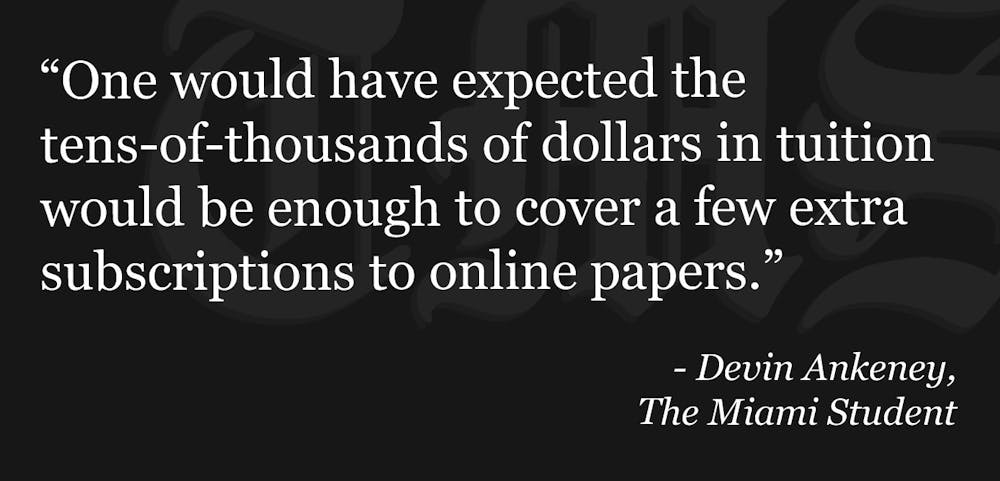“You’ve already read your two free articles for the month. Subscribe for more.”
*click*
Nope, way too much money.
We’ve all gotten to this point. Reading through a couple of articles to better inform ourselves for the day, then the USA Today, The Guardian or The Washington Post paywalls hinder any further access to information and news for those without a subscription.
The largest newspapers in the country have paywalls. The New York Times, The Washington Post, The Wall Street Journal and USA Today all have paid subscriptions that allow the reader to access everything ever written for that paper.
At an institution of higher education that wishes to “defend the freedom of inquiry that is the heart of learning” via an informed student body, there are but only two major national newspapers students have unlimited and current access to: The New York Times and The Wall Street Journal.
The former is known for unbiased, skillful reporting with a famous editorial board and a massive circulation. The latter is well-known for its economic reporting, a clear nod to the ever-prioritized Farmer School of Business.
I have no qualms about having access to these papers. In fact, they’re quite trustworthy news sources. But only being able to read two is inherently narrowing to one’s worldview, especially when those two are known for being consumed by a somewhat elitist audience.
Reporters can never be truly without bias, and reading from the same people and sources consolidates a person’s views and forces them into a corner we’ve recently seen many Americans fall into. This can lend itself to the inability to change one’s mind or see another perspective.
I often find myself asking how students can be expected to fork up the hundreds of dollars it would take to be reasonably informed from an array of sources wide enough to garner an unbiased understanding of the world.
One would have expected the tens-of-thousands of dollars in tuition would be enough to cover a few extra subscriptions to online papers.
It’s blatantly classist that only those with disposable income can afford to be well-informed.
Enjoy what you're reading?
Signup for our newsletter
With the recent article published in The Miami Student on how small our population of Pell Grant recipients is, I can’t help but notice a pattern of policies and practices that prioritize students and families with wealth.
With only 13% of our student body “who display exceptional financial need,” (the lowest among public four-year colleges in Ohio), it becomes ever more clear that Miami can expect its students to pay for their news, as Miami attracts those with the money to do so.
Miami must invest in an equitably informed student body. The Washington Post, USA Today, The New Yorker, The Atlantic, The Guardian, Le Monde and Time Magazine are just a few of the immensely important news sources from which we should have unencumbered and free access.
And no, the print copies stashed in King Library, a trek for many of us both on and off campus, are not even remotely enough for the student body to be reasonably well-informed, especially noting how many fewer articles are in print compared to online.
College is meant to be a period of our lives when we learn to think more openly, learn to take in a wider array of perspectives and views and learn how to comprehend the vast and complex world upon which we live.
Good journalism is the epitome of free expression and free thought. Miami’s philosophy of a liberal arts education is based on these same values. Their view of a liberal arts education teaches students to “Be curious. Ask questions. Seek answers. Explore. Experience. Express.” Yet, Miami does not provide its student body with the resources to achieve these goals.
To “become a better global citizen,” one must know of global events, the international system, international news. This is such a simple solution to widely achieve the goals Miami sets out for its students.
The expectation that students, many of whom are in debt from college costs, must find a way to pay to be informed while the administration embodies performative values is horrifyingly hypocritical to the Miami mantra of Love & Honor.
Love and honor your students by giving them knowledge. By giving them truth.




